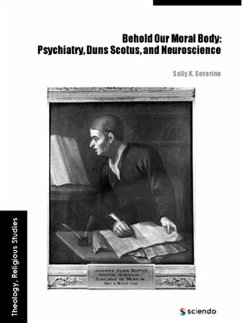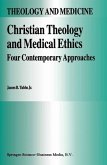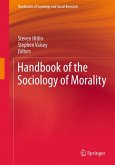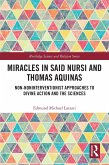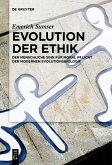For centuries, science and religion have been on the opposite sides of the debate about the moral nature of human beings. Now science is confirming what people of faith have long known: human morality is embedded in our biology. Drawing on the latest research in neuroanatomy, neurophysiology, and behavioral science, this book affirms the four-fold prophetic vision of morality as expressed hundreds of years ago by the great philosopher and theologian, the Blessed John Duns Scotus. It proclaims the dignity of the individual and celebrates freedom of will for moral living, stemming from the place of innate natural goodness where love prevails.
Dieser Download kann aus rechtlichen Gründen nur mit Rechnungsadresse in A, B, BG, CY, CZ, D, DK, EW, E, FIN, F, GR, HR, H, IRL, I, LT, L, LR, M, NL, PL, P, R, S, SLO, SK ausgeliefert werden.
"This is a beautifully written book - more like leaping on a train and wondering where it will go than reading in the usual sense. People interested in the interface of spirituality and clinical neuroscience will enjoy the journey of this work." -- Laura Weiss Roberts, M.D., M.A., Chairman and Katharine Dexter McCormick and Stanley McCormick Memorial Professor, Department of Psychiatry and Behavioral Sciences, Stanford University School of Medicine
"To me this is an unexpected book. The many parallels between the medieval insights of the theologian Duns Scotus and current psychiatry and neuroscience are intriguing. They help us to look at the ancient and modern-and our behavior-in new light. Another consistent theme in the book is the importance of love (emotion) in addition to intellect (cognition). We are embodied, and so must be the morality that governs our relationships if it is to be fully human. Whether you are interested in how we develop emotionally and socially through imitation, or in the role of free will and desire, or in justice and goodness, do read this book." -- Dr. Christopher J. Corbally, S.J., Vatican Observatory
"Sally Severino's book on the connection of Christian beliefs and neuroscience will be of special interest to three broad groups: a) doctors and psychologists who are treating religious patients and b) religious individuals who are interested in the connection of their beliefs and recent discoveries in the neurosciences and c) anyone interested in child development. By weaving together aspects of science and aspects of religion Dr. Severino has made an important contribution to building bridges between these two realms. A surprising bonus is that strong connections are made to the thinking of Duns Scotus a Franciscan priest who lived more than 700 years ago." -- Stanley Klein, Ph.D., Professor of Optometry, Neuroscience and Bioengineering, University of California, Berkeley
"What does medieval theology have in common with modern neuroscience? Sally Severino, a trained psychiatrist, claims there is much in common. She brings together the religious insights of the medieval theologian John Duns Scotus with the discoveries of modern psychiatry and neuroscience in a way that is original and insightful. Behold Our Moral Body is designed to address the questions of what morality is, where the roots of right action rest and how our bodies express morality. Severino reveals new insights on the dignity of the human person as a moral, conscious body of action. We are not souls in bodies but bodily persons in whom the confluence of mind and matter is expressed in moral action and moral decision-making. Severino shows how the discoveries of modern neuroscience were anticipated in the writings of Duns Scotus many centuries ago. For those interested in the nexus between science and religion, this book is a timely contribution." Ilia Delio, OSF, Senior Research Fellow, Science and ReligionWoodstock Theological Center, Georgetown University
"Physician and psychoanalyst Sally Severino has written a thoughtful and well-researched book tying together findings in the areas of developmental neurology, attachment theory, and theology. The idea is that we are wired to be moral beings, but lots of things get in the way. The author shows how we can better educate and socialize our children to foster right living. It's a good effort on a complicated topic that should be read by anyone interested in the interaction of biology and morality." -- Ian Osborn, M.D. , Author of Tormenting Thoughts and Secret Rituals: The Hidden Epidemic of Obsessive-Compulsive Disorder and Can Christianity Cure Obsessive Compulsive Disorder? A Psychiatrist Explores the Role of Faith in Treatment
"The Moral Body indeed. With both intuitive and scientific prescience, Sally Severino weaves multi-textured strands to fashion a shimmering vestment of emotional sensibility-a cloak for the twin naked emperors of moral relativism and fundamentalism. This elegant cloak also offers Sir Walter Raleighesque serviceability in covering the stumble puddles of mind-body dualism and the naturalistic fallacy; for the embodied, empathic, self-regulatory values of pleasure and pain are indeed universal." -- Katherine Peil, Director, EFS International www.emotionalsentience.com
"Dr. Severino has undertaken a bold and creative project: bringing the insights of a14th-century thinker into dialogue with today's scientific insights into human behavior. The medieval Franciscan thinker John Duns Scotus figures as the dialogue partner of 21st-century psychiatry and neuroscience in this work by an author who is herself also a trained psychiatrist. The great moral themes of human freedom and moral choice meet the fascinating world of brain chemistry, human development from childhood through adulthood, and why we make the choices we do. Behold the Moral Body reveals both a deeply pondered and a deeply felt approach to topics both challenging and important in our day." -- William Short, OFM, Franciscan School of Theology
"With decades of research to back her up, psychiatrist and contemplative Sally Severino offers the fascinating theory that ancient Christianity correctly intuited the neurological roots of our moral selves and that religion still offers us a way to develop our innate capacities for goodness and love. In perilous times like our own, this is a message we desperately need to hear." -- Paula Huston, Author of Simplifying the Soul, Forgiveness, By Way of Grace and others.

